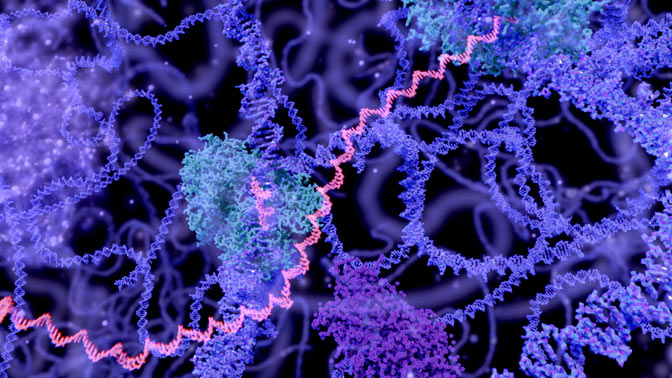
Prostate cancer researchers have mapped the impact of an acquired mutation—which is found in about 50% of patient tumour samples—that alters epigenetic identity. The discovery also identifies a new opportunity for targeted therapy.
The findings are published online today in Nature Genetics. The research shows how an acquired mutation involving the fusion of two genes (TMPRSS2 and ERG) can change the epigenetic identity of tumours leading to some genes being turned on while others are turned off, says PM Cancer Centre Senior Scientist Dr. Mathieu Lupien, corresponding author and a member of its Cancer Epigenetics Program—a team focused on breaking the code of cancer.
To learn more about epigenetics in cancer, watch a short video featuring Dr. Lupien, who is also an Associate Professor in the Department of Medical Biophysics, University of Toronto. You can also watch him talk about his current research findings at https://youtu.be/mCDjS-TfS0Q.
The discoveries highlight how mutations can influence epigenetics in prostate tumours and change the identity of cancer cells. Dr. Lupien’s team exploited this fact to identify mechanisms that drive development of fusion-positive prostate cancer.
“Our findings specifically show that fusion-positive prostate cancer is dependent on the NOTCH signalling pathway, which can be blocked chemically in pre-clinical models,” says Dr. Lupien. “This identifies a promising druggable target against fusion-positive prostate cancer and takes us a step closer to providing personalized cancer medicine for up to 50% of prostate cancer patients,” he says.
“We’re hopeful this research can be translated into clinical care in the near future to offer patients an additional, tailored treatment to complement the current standard of care, based on their fusion profile.”
The study team consisted of scientists, pathologists and clinician-scientists involved in the Canadian Prostate Cancer Genome Network (CPC-GENE), the world-leading prostate cancer sequencing program co-led by Dr. Robert Bristow at PM Cancer Centre and Dr. Paul Boutros at the Ontario Institute for Cancer Research.
TMPRSS2-ERG fusion co-opts master transcription factors and activates NOTCH signaling in primary prostate cancer. Kron KJ, Murison A, Zhou S, Huang V, Yamaguchi TN, Shiah YJ, Fraser M, van der Kwast T, Boutros PC, Bristow RG, Lupien M. Nat Genet. 2017 Aug 7. doi: 10.1038/ng.3930.
Supported by the Movember Foundation through Prostate Cancer Canada, the Ontario Institute for Cancer Research funded by the Government of Ontario, and The Princess Margaret Cancer Foundation.




